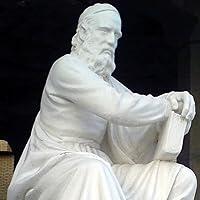
Omar Khayyám
عن المؤلف
Omar Khayyám was a prominent Persian mathematician, astronomer, and poet, born in Nishapur in 1048. He is best known for his poetic work, the Rubáiyát, which consists of quatrains that explore themes of love, life, and the nature of existence. His verses combine a deep appreciation for the beauty of the world with a philosophical inquiry into the human condition, making him a central figure in Persian literature. Aside from his literary achievements, Khayyám made significant contributions to mathematics, particularly in the field of algebra, where he solved cubic equations and developed a method for extracting roots.
Khayyám's influence extended beyond poetry and mathematics; he also played a role in the development of the Persian calendar, creating a solar calendar that was more accurate than the Julian calendar of the time. His work in astronomy culminated in the creation of a detailed astronomical table. Despite his scientific contributions, it is his poetry that has left a lasting legacy, inspiring countless writers and thinkers across cultures and generations. Khayyám's ability to blend scientific inquiry with poetic expression continues to resonate today, securing his place as one of the most revered figures in Persian history.